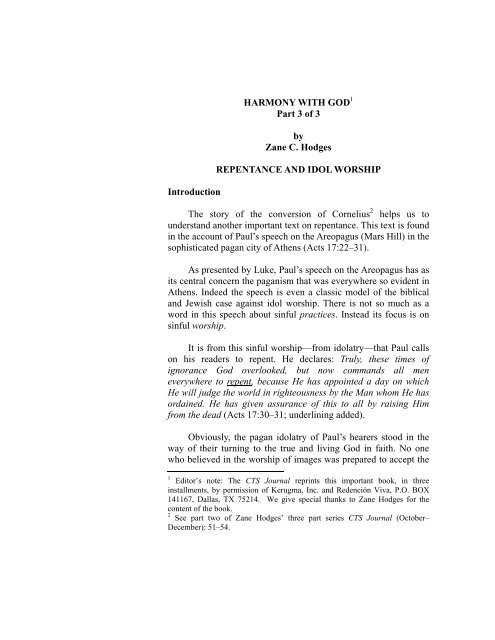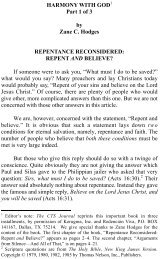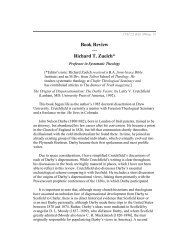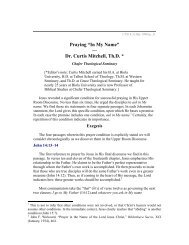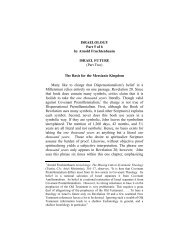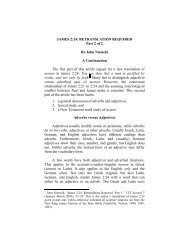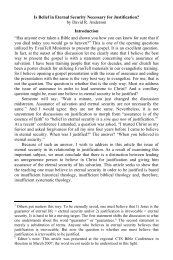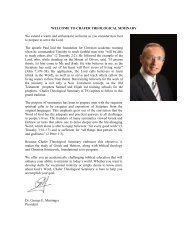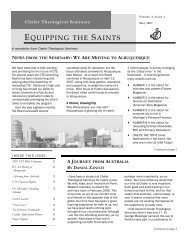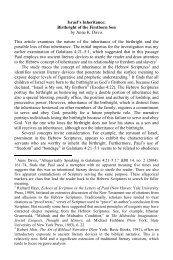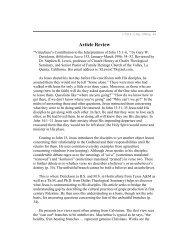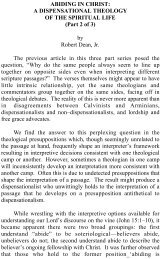HARMONY WITH GOD Part 3 of 3 by Zane C. Hodges - Chafer ...
HARMONY WITH GOD Part 3 of 3 by Zane C. Hodges - Chafer ...
HARMONY WITH GOD Part 3 of 3 by Zane C. Hodges - Chafer ...
Create successful ePaper yourself
Turn your PDF publications into a flip-book with our unique Google optimized e-Paper software.
Introduction<br />
<strong>HARMONY</strong> <strong>WITH</strong> <strong>GOD</strong> 1<br />
<strong>Part</strong> 3 <strong>of</strong> 3<br />
<strong>by</strong><br />
<strong>Zane</strong> C. <strong>Hodges</strong><br />
REPENTANCE AND IDOL WORSHIP<br />
The story <strong>of</strong> the conversion <strong>of</strong> Cornelius 2 helps us to<br />
understand another important text on repentance. This text is found<br />
in the account <strong>of</strong> Paul’s speech on the Areopagus (Mars Hill) in the<br />
sophisticated pagan city <strong>of</strong> Athens (Acts 17:22–31).<br />
As presented <strong>by</strong> Luke, Paul’s speech on the Areopagus has as<br />
its central concern the paganism that was everywhere so evident in<br />
Athens. Indeed the speech is even a classic model <strong>of</strong> the biblical<br />
and Jewish case against idol worship. There is not so much as a<br />
word in this speech about sinful practices. Instead its focus is on<br />
sinful worship.<br />
It is from this sinful worship—from idolatry—that Paul calls<br />
on his readers to repent. He declares: Truly, these times <strong>of</strong><br />
ignorance God overlooked, but now commands all men<br />
everywhere to repent, because He has appointed a day on which<br />
He will judge the world in righteousness <strong>by</strong> the Man whom He has<br />
ordained. He has given assurance <strong>of</strong> this to all <strong>by</strong> raising Him<br />
from the dead (Acts 17:30–31; underlining added).<br />
Obviously, the pagan idolatry <strong>of</strong> Paul’s hearers stood in the<br />
way <strong>of</strong> their turning to the true and living God in faith. No one<br />
who believed in the worship <strong>of</strong> images was prepared to accept the<br />
1 Editor’s note: The CTS Journal reprints this important book, in three<br />
installments, <strong>by</strong> permission <strong>of</strong> Kerugma, Inc. and Redención Viva, P.O. BOX<br />
141167, Dallas, TX 75214. We give special thanks to <strong>Zane</strong> <strong>Hodges</strong> for the<br />
content <strong>of</strong> the book.<br />
2 See part two <strong>of</strong> <strong>Zane</strong> <strong>Hodges</strong>’ three part series CTS Journal (October–<br />
December): 51–54.
Harmony with God 19<br />
exclusive claims <strong>of</strong> the Creator and <strong>of</strong> His Son, Jesus Christ.<br />
According to Paul, the God he proclaimed was the Judge <strong>of</strong> all the<br />
world. Thus a man’s eternal destiny was determined <strong>by</strong> the true<br />
and living God, not <strong>by</strong> any <strong>of</strong> the countless pagan deities that<br />
Athens honored with her idols.<br />
Thus Paul’s call for repentance from idolatry was intended to<br />
prepare his hearers to have dealings with the God who would<br />
“judge the world in righteousness.”<br />
Cornelius, as we have previously seen, 3 had already given up<br />
his idolatry before Peter came to his house. He was ready for<br />
Peter’s message. But where this readiness was not present—as it<br />
was not on the Areopagus—Paul’s message must lay the<br />
groundwork for that <strong>by</strong> challenging his hearers to turn to God from<br />
idols (see 1 Thess. 1:9).<br />
Let us remember here too that the speech recorded in Acts<br />
17:22–31 is the merest fragment <strong>of</strong> what Paul must have said on<br />
this occasion. That he must have mentioned faith in Christ is<br />
shown <strong>by</strong> the fact that some men joined him and believed (17:34;<br />
underlining added). But Luke’s purpose behind his record here is<br />
to show how Paul dealt with idolatry in the Gentile world. His<br />
purpose is not to give a complete account <strong>of</strong> all that Paul said.<br />
Clearly we see here how repentance can prepare the way for<br />
faith. It is no different than when an unsaved person turns in<br />
disgust from a sinful lifestyle and looks for a relationship with<br />
God. Repentance does not save him, but it prepares him to come to<br />
faith.<br />
Thus we can more accurately appreciate Paul’s summary <strong>of</strong><br />
his own preaching as the process <strong>of</strong> testifying to Jews, and also to<br />
Greeks, repentance toward God and faith toward our Lord Jesus<br />
Christ (Acts 20:21; underlining added; see also Acts 26:20). As<br />
3 See CTS Journal (October–December 2002): 52–54.
20 CTS Journal 9 (Spring 2003)<br />
this statement plainly shows, repentance and faith are <strong>by</strong> no means<br />
synonymous. They are distinct issues.<br />
Conclusion<br />
Luke’s treatment <strong>of</strong> the theme <strong>of</strong> repentance and forgiveness<br />
in connection with the Gentile mission has two significant aspects.<br />
(1) Repentance from pagan idolatry is an important step toward<br />
faith wherever idolatry has created a barrier to coming to faith in<br />
Christ. (2) Faith in Christ not only bestows eternal life on the<br />
Gentile believer but bestows forgiveness as well.<br />
Thus, at the moment he believes in Christ, the Gentile<br />
believer enters into personal harmony with the God from whom he<br />
had been estranged.<br />
REPENTANCE IN PALESTINE<br />
Many <strong>of</strong> the New Testament references to repentance refer to<br />
the situation in Palestine during, and immediately following, the<br />
ministry <strong>of</strong> John the Baptist and <strong>of</strong> our Lord Jesus Christ. No<br />
discussion <strong>of</strong> repentance would be complete without considering<br />
these passages.<br />
In the process <strong>of</strong> examining this class <strong>of</strong> passages, we will<br />
encounter some special historical situations that are crucial to<br />
completing our study on repentance. Even if they are not<br />
mentioned specifically, passages that are to be understood in the<br />
light <strong>of</strong> the following discussion are: Matthew 3:2, 8, 11; 4:17;<br />
9:13; Mark 1:4, 15; 2:17; 6:12; Luke 3:3, 8; 5:32; and Acts 5:31;<br />
13:24.
Repentance and John the Baptist<br />
Harmony with God 21<br />
We can hardly find a better summary <strong>of</strong> the ministry <strong>of</strong> John<br />
the Baptist than the one Paul gives in Acts 19:4. There he is<br />
addressing some disciples who seemed to lack the gift <strong>of</strong> the Spirit.<br />
His question to them had been: Did you receive the Holy Spirit<br />
when you believed (Acts 19:2)?<br />
To this question the disciples replied, We have not so much as<br />
heard if the Holy Spirit is here (Acts 19:2; underlining added). The<br />
words “is here” translate a Greek phrase that can be rendered<br />
simply “is.” From this fact many have drawn the conclusion that<br />
these disciples <strong>of</strong> John the Baptist had no knowledge <strong>of</strong> the Third<br />
Person <strong>of</strong> the Trinity, i.e., they did not know He existed.<br />
This is highly improbable, since John the Baptist, whose<br />
disciples they were, preached about the Spirit (Mark 1:8 and other<br />
places). But a clue to the real meaning <strong>of</strong> the text, we find in John<br />
8:39.<br />
In that passage John explains a statement made <strong>by</strong> our Lord<br />
<strong>by</strong> saying, But this He spoke concerning the Spirit, whom those<br />
believing in Him would receive; for the Spirit was not yet given<br />
[supplied <strong>by</strong> NKJV], because Jesus was not yet glorified (John<br />
7:39). The literal rendering would be: “the Spirit was not yet”!<br />
Both in Acts 19:4 and John 7:39, the coming <strong>of</strong> the Holy<br />
Spirit at Pentecost is described <strong>by</strong> a simple “to be” verb. Since the<br />
author <strong>of</strong> the Fourth Gospel was almost certainly originally a<br />
disciple <strong>of</strong> the Baptist (i.e., he is the unnamed disciple in John<br />
1:35–40), we probably have here an expression used among the<br />
disciples <strong>of</strong> the Baptist. To say that “the Holy Spirit is not yet” or<br />
“is” was to state that He had not yet come or had come. This alone<br />
makes real sense <strong>of</strong> Acts 19:2.<br />
Once he has discovered that these men did not yet possess the<br />
gift <strong>of</strong> the Spirit, Paul asks a further question: Into what then were
22 CTS Journal 9 (Spring 2003)<br />
you baptized (19:3)? (That Paul should think <strong>of</strong> baptism here is a<br />
most interesting fact to which we will return later in the section.) 4<br />
The men reply, Into John’s baptism (19:3).<br />
As soon as Paul has ascertained that these disciples were<br />
John’s disciples, he reminds them <strong>of</strong> the nature <strong>of</strong> John’s ministry.<br />
His words are, John baptized with a baptism <strong>of</strong> repentance, saying<br />
to the people that they should believe on Him who would come<br />
after him, that is, on Christ Jesus (Acts 19:4). The result <strong>of</strong> this<br />
explanation <strong>by</strong> Paul is that these men were baptized in the name <strong>of</strong><br />
the Lord Jesus (19:5) and then—but only then—do they receive<br />
the Holy Spirit <strong>by</strong> the laying on <strong>of</strong> Paul’s hands (19:6).<br />
For the moment we must especially note the preparatory<br />
nature <strong>of</strong> John’s ministry proclaiming repentance. It was designed<br />
to prepare “the people” for faith. Thus far, at least, this is<br />
consistent with what we have already learned about the<br />
relationship between repentance and faith.<br />
The Fruits <strong>of</strong> Repentance<br />
Paul’s summary <strong>of</strong> John’s ministry is perfectly accurate. But<br />
the Gospels give us somewhat more detail. For one thing, they<br />
inform us that John called for the production <strong>of</strong> fruits worthy <strong>of</strong><br />
repentance (Matthew 3:8; Luke 3:8).<br />
If we ask what these fruits were to be, the answer is perfectly<br />
clear in Luke 3:10–14 where, in response to a series <strong>of</strong> questions<br />
asking, What shall we do? (vv 10, 12, 14), the people, tax<br />
collectors and soldiers are all informed about the actions that<br />
constitute the fruit <strong>of</strong> repentance. Needless to say, had such actions<br />
been carried out on a wide scale the entire atmosphere in Israel<br />
would have been changed, and the nation would have been<br />
preparing itself for faith in the One coming after John.<br />
4 Cf page 26 (below).
Harmony with God 23<br />
Although the simple gospel <strong>of</strong> faith in Christ specifies no<br />
preconditions at all, the fact remains that a repentant heart is<br />
obviously better soil for faith than an unrepentant one. It is one<br />
thing to say that repentance facilitates faith in Christ for eternal<br />
life—the Bible teaches that. It is quite another thing to say that<br />
repentance is a requirement for eternal life. That the Bible does not<br />
teach.<br />
But even in the ministry <strong>of</strong> John the Baptist the theme <strong>of</strong><br />
impending temporal judgment is a part <strong>of</strong> his message about<br />
repentance.<br />
The Ax and the Fire<br />
When John the Baptist exhorted his audience to bear fruits<br />
worthy <strong>of</strong> repentance (Matthew 3:8; Luke 3:8), he warned them<br />
that even now the ax is laid to the root <strong>of</strong> the trees. Therefore every<br />
tree which does not bear good fruit is cut down and thrown into<br />
the fire (Matthew 3:10–11; Luke 3:9). There is little reason to<br />
doubt that here John was speaking prophetically about the<br />
impending disaster that was to come on the nation <strong>of</strong> Israel during<br />
the calamitous war with Rome in 66–70 A.D.<br />
In the light <strong>of</strong> all we have seen about repentance up to now,<br />
there is nothing to commend the view that John is referring to the<br />
“fire” <strong>of</strong> eternal damnation. Fire is a frequent Old Testament image<br />
<strong>of</strong> God’s temporal wrath and there is no justification for not taking<br />
it that way here. See, for example, its repeated use in this way in<br />
Amos 1:4, 7, 10, 12, 14; 2:2, 5. (For the imagery <strong>of</strong> God’s wrath as<br />
fire burning up trees, see Jeremiah 21:12–14; 22:6–7; Ezekiel<br />
15:1–8 [the wood <strong>of</strong> the vine]; see also Isaiah 9:19; Jeremiah<br />
48:45; Hosea 8:14; Nahum 1:6; Zephaniah 1:18; the references<br />
could be multiplied.)<br />
Clearly John’s call to repentance accompanied <strong>by</strong> its fruits<br />
adheres firmly to the Bible’s fundamental concept <strong>of</strong> repentance.<br />
By repenting sincerely so that the appropriate actions follow,
24 CTS Journal 9 (Spring 2003)<br />
human beings are invited to escape, or avoid, the temporal<br />
judgments <strong>of</strong> God. But such repentance can lead on to the<br />
experience <strong>of</strong> forgiveness <strong>of</strong> sin and harmony with God. This too<br />
was a part <strong>of</strong> John’s message.<br />
Baptism for Forgiveness<br />
Two texts in the Gospels (Mark 1:4 and Luke 3:3) directly<br />
declare that John preached a baptism <strong>of</strong> repentance for the<br />
remission [forgiveness] <strong>of</strong> sins. It is plain, therefore, that John’s<br />
audience was being told that the baptism <strong>by</strong> which they expressed<br />
their repentance was a condition for the forgiveness <strong>of</strong> their sins.<br />
In other words, they could not achieve harmony with God<br />
apart from receiving baptism. But it does not follow from this that<br />
forgiveness was bestowed at once on all who were baptized—or<br />
even upon those who did this sincerely (in contrast to going along<br />
with the crowds). As we have already suggested, true harmony<br />
with God our Maker can only begin when we enter His family <strong>by</strong><br />
way <strong>of</strong> new birth. Until then, the unsaved man is dead in<br />
trespasses and sins (Ephesians 2:5).<br />
As we have seen, even Cornelius who had sincerely turned to<br />
God with actions that God acknowledged, did not have either<br />
peace or forgiveness before he believed in Christ (cf. Acts 10:36,<br />
43). In the same way, we should conclude that just as John’s<br />
baptism was intended to prepare men for faith in the Messiah who<br />
would soon appear, so also it prepared them to receive the<br />
forgiveness which only faith in Him could give.<br />
But there was a difference from the experience <strong>of</strong> Cornelius.<br />
Cornelius received forgiveness before water baptism. The Jews <strong>of</strong><br />
Palestine could not.
Palestine after the Cross<br />
Harmony with God 25<br />
We need to recall that impressively large numbers <strong>of</strong><br />
Israelites accepted John’s baptism. Mark records that all the land<br />
<strong>of</strong> Judea, and those from Jerusalem, went out to him and were all<br />
baptized <strong>by</strong> him in the Jordan River, confessing their sins (Mark<br />
1:5; underlining added). Matthew and Luke refer as well to all the<br />
region around the Jordan (Matthew 3:5, underlining added; Luke<br />
3:8). What amounted to a national revival appeared to be taking<br />
place.<br />
But the spiritual movement begun <strong>by</strong> John eventually<br />
collapsed. True, many Israelites believed in the One John had<br />
proclaimed (and thus entered into harmony with God through<br />
forgiveness <strong>of</strong> sins), but many more did not. What had begun as a<br />
wave <strong>of</strong> national repentance was reversed over time into a national<br />
rejection <strong>of</strong> God’s Christ, with the people loudly demanding that<br />
Jesus be crucified and invoking the dreadful curse, His blood be on<br />
us and on our children (Matthew 27:25).<br />
This tragic departure from an initial movement in the<br />
direction <strong>of</strong> faith in Christ and harmony with His heavenly Father<br />
left Israel more estranged than ever from her God. It is not at all<br />
incomprehensible that God should withhold the privilege <strong>of</strong><br />
harmony with Himself until a repentant Israelite submitted to<br />
baptism in the name <strong>of</strong> His beloved Son, whom Israel had<br />
crucified. The evidence <strong>of</strong> the book <strong>of</strong> Acts points unmistakably to<br />
the conclusion that God insisted on this kind <strong>of</strong> baptism before He<br />
would forgive the sins <strong>of</strong> the believing Israelites or grant them the<br />
gift <strong>of</strong> the Holy Spirit.<br />
Let it be clearly said that the simple way <strong>of</strong> eternal salvation<br />
was not changed, even for the Israelites <strong>of</strong> Palestine. Eternal life is<br />
always received on the basis <strong>of</strong> faith alone in Christ alone. Thus<br />
the Judge <strong>of</strong> all mankind accepts the faith <strong>of</strong> any and every human<br />
being who believes in Christ for eternal life. No such person is in<br />
any danger at all <strong>of</strong> eternal damnation.
26 CTS Journal 9 (Spring 2003)<br />
But forgiveness, as we have seen, is personal and not<br />
judicial. God may set whatever terms He wishes for the restoration<br />
<strong>of</strong> harmony with Himself. The evidence <strong>of</strong> Acts loudly proclaims<br />
the special conditions that obtained in Palestine immediately after<br />
the cross.<br />
Baptism in Jesus’ Name<br />
The disciples <strong>of</strong> John whom Paul encountered in Acts 19<br />
were obviously Palestinians. We must conclude this from the fact<br />
that the ministry <strong>of</strong> John the Baptist was confined to that land. But<br />
equally obvious is the fact that though they had believed (Acts<br />
19:2), this did not immediately confer on them the gift <strong>of</strong> the Holy<br />
Spirit. Among Palestinians, God was only bestowing the Holy<br />
Spirit on baptized believers.<br />
Paul knew this, <strong>of</strong> course, and when he discerns that the<br />
twelve do not yet have the Spirit, he turns at once to the issue <strong>of</strong><br />
baptism. And though these men have been baptized, their baptism<br />
was with John’s baptism (Acts 19:3). Thereupon Paul proceeds to<br />
baptize them in the name <strong>of</strong> the Lord Jesus (Acts 19:5), after which<br />
he laid hands on them and the Holy Spirit came upon them (Acts<br />
19:6).<br />
It is perfectly obvious that baptism in the name <strong>of</strong> Jesus is the<br />
issue here. For these men it had to precede the gift <strong>of</strong> the Spirit.<br />
What we see in Acts 19 replicates what occurs in Samaria in<br />
Acts 8. The converts <strong>of</strong> Philip the evangelist receive the Holy<br />
Spirit only after baptism and only after the apostles Peter and John<br />
come down to them, pray for them and bestow the Spirit on them<br />
exactly as Paul did to the twelve in Acts 19. The Samaritans too, <strong>of</strong><br />
course, were Palestinians and had been exposed to the ministry <strong>of</strong><br />
John and <strong>of</strong> the Lord Jesus Christ.<br />
The same thing may be said <strong>of</strong> Acts 2:38, a verse widely<br />
misunderstood and misapplied. When the Pentecost audience heard
Harmony with God 27<br />
Jesus proclaimed as both Lord and Christ (Acts 2:36), they<br />
indicated their belief <strong>of</strong> this truth with the words, Men and<br />
brethren, what shall we do (Acts 2:37)? But to believe that Jesus is<br />
the Christ is to be born again and possess eternal life (John 20:30,<br />
31; 1 John 5:1). Thus at this point the hearers who asked this<br />
question had been eternally saved!<br />
What did they lack? They lacked harmony with God, whom<br />
they had so deeply <strong>of</strong>fended. What did they need to do? Two<br />
things: Repent, and let every one <strong>of</strong> you be baptized in the name <strong>of</strong><br />
Jesus Christ (Acts 2:38). What would happen if they did these<br />
things? The answer is that they would receive remission<br />
[forgiveness] <strong>of</strong> sins and the gift <strong>of</strong> the Holy Spirit (Acts 2:38).<br />
There is no need here to attempt, as many have done, to make<br />
this famous verse (Acts 2:38) say the same thing as John 3:16;<br />
5:24; 6:47; and many other verses. It does not say the same thing!<br />
Why not? Because eternal life and forgiveness <strong>of</strong> sins are not the<br />
same thing! The former is required for eternal salvation, the latter<br />
for harmony with God.<br />
Paul, the Jewish Model<br />
We have seen already that Cornelius is the classic model for<br />
Gentile salvation. He believes in Christ and immediately receives<br />
the forgiveness <strong>of</strong> sins and the Holy Spirit. Paul, however, is the<br />
model for the salvation <strong>of</strong> Palestinian Jews.<br />
If we ask at what point Paul believed that Jesus was the<br />
Christ and received eternal life, there can be only one answer. It<br />
happened on the road to Damascus when the Risen Savior<br />
responded to Paul’s question, Who are you, Lord? with this reply, I<br />
am Jesus, whom you are persecuting (Acts 9:5). There is no reason<br />
to doubt that Paul believed these words then and there and thus<br />
received eternal salvation (1 John 5:1).
28 CTS Journal 9 (Spring 2003)<br />
But not forgiveness <strong>of</strong> sins. Indeed, it is only from his speech<br />
to the Jerusalem mob in Acts 22 that we actually learn when Paul<br />
was forgiven. It should be noted in regard to this speech that Paul<br />
is deliberately identifying with his Palestinian audience in order to<br />
draw them to faith in Christ (see Acts 22:3). His experience can be<br />
theirs as well. So it is only here that we discover some details <strong>of</strong><br />
the visit <strong>of</strong> Ananias to Paul that are not given in Luke’s other<br />
accounts <strong>of</strong> Paul’s conversion (Acts 9 and 26).<br />
In Acts 22 alone do we learn that Ananias said to Paul on that<br />
occasion, And now why are you waiting? Arise and be baptized,<br />
and wash away your sins, calling on the name <strong>of</strong> the Lord (Acts<br />
22:16; underlining added). Here we note once again the intimate<br />
connection between baptism and the forgiveness <strong>of</strong> sins for a<br />
Palestinian convert (even though he is in Damascus at this<br />
moment!). That Paul also received the Holy Spirit at this time is<br />
indirectly suggested <strong>by</strong> Acts 9:17. Thus Paul’s own experience <strong>of</strong><br />
conversion fundamentally reproduces the sequence found in Acts<br />
2:36–38.<br />
Paul’s total conversion experience, therefore, is the model for<br />
the conversion <strong>of</strong> Palestinian Jews: that is, (1) faith for eternal life<br />
and (2) baptism for the forgiveness <strong>of</strong> sins, followed <strong>by</strong> (3) the gift<br />
<strong>of</strong> the Holy Spirit. Cornelius on the other hand is the Gentile<br />
model: (1) faith immediately bringing eternal life, forgiveness <strong>of</strong><br />
sins, and the gift <strong>of</strong> the Holy Spirit, followed <strong>by</strong> (2) water baptism.<br />
When these sequences are kept in mind, the confusion many<br />
have felt about certain statements in Acts is removed. For<br />
Cornelius, repentance preceded the whole process though it was<br />
not a condition for salvation. For Paul, as for all Palestinians,<br />
repentance preceded forgiveness and was a condition for that,<br />
though not for eternal salvation.<br />
Of course, the text <strong>of</strong> Acts 22 does not specifically indicate<br />
exactly when Paul repented. But this could hardly have occurred<br />
before he received an answer to his question, Who are you, Lord?
Harmony with God 29<br />
Only after the reply, I am Jesus <strong>of</strong> Nazareth, whom you are<br />
persecuting (Acts 22:8) could he have had the information needed<br />
for repentance. So here, clearly, belief that the glorified Jesus was<br />
the Christ necessarily preceded his repentance. This parallels the<br />
faith implicitly expressed in Acts 2:37, which precedes the call to<br />
repentance in Acts 2:38.<br />
The parallelism between Paul’s experience and that <strong>of</strong> the<br />
converts <strong>of</strong> Acts 2 is thus very precise.<br />
The Gift <strong>of</strong> the Holy Spirit<br />
Receiving the gift <strong>of</strong> the Holy Spirit, <strong>of</strong> course, is not<br />
identical with being born again <strong>by</strong> the Spirit. New birth has<br />
always been a condition for entrance into the kingdom <strong>of</strong> God<br />
(John 3:3), but the gift <strong>of</strong> the Spirit, which creates our union<br />
with the spiritual body <strong>of</strong> Christ (1 Corinthians 12:13), has<br />
only been given since Pentecost (John 7:39). Old Testament<br />
saints did not have such a union with Christ, which exists only<br />
<strong>by</strong> means <strong>of</strong> the permanent indwelling <strong>of</strong> God’s Spirit (see the<br />
contrast between with you and in you in John 14:17).<br />
The gift <strong>of</strong> the Spirit, <strong>of</strong> course, is not merited in any way<br />
<strong>by</strong> any act or deed. What could earn us such a gift? But in Acts<br />
this special gift was only bestowed on those who obtained<br />
harmony with God through the forgiveness <strong>of</strong> sins. This is true<br />
<strong>of</strong> Gentiles and Jews alike, though with Gentiles it is<br />
simultaneous with everything else the believer gets at the<br />
moment <strong>of</strong> faith.<br />
Eternal life is a free gift given to all who believe. The gift<br />
<strong>of</strong> the Spirit is God’s gift to that circle <strong>of</strong> people that is in<br />
harmony with Himself. It is like the man who goes out at the<br />
Christmas season to buy gifts for all his friends. The fact that<br />
he does not also buy gifts for everyone in his neighborhood<br />
does not make his presents for his friends anything less than<br />
free gifts.
30 CTS Journal 9 (Spring 2003)<br />
Eternal life is God’s universal gift, <strong>of</strong>fered to all humanity<br />
on the basis <strong>of</strong> faith alone. The gift <strong>of</strong> the Holy Spirit is His<br />
restricted gift, given to all who have come into harmony with<br />
Himself <strong>by</strong> means <strong>of</strong> the forgiveness <strong>of</strong> sins.<br />
In the Palestinian situation that followed the crucifixion<br />
<strong>of</strong> our Lord Jesus Christ, God insisted that Palestinian Jews<br />
who were exposed to the baptizing witness <strong>of</strong> John should<br />
receive baptism in Jesus’ name. If they were already believers,<br />
like the twelve men <strong>of</strong> Acts 19 (see vs. 2), they needed baptism<br />
only to place themselves in a position to receive the Spirit.<br />
Presumably these twelve men had received both eternal<br />
life and forgiveness <strong>of</strong> sins before they encountered Paul. Paul<br />
says nothing to them about either <strong>of</strong> these things. The sole<br />
question is whether they possessed the gift <strong>of</strong> the Spirit, and for<br />
this they needed baptism in the name <strong>of</strong> Jesus Christ.<br />
This suggests that they are examples <strong>of</strong> sincere disciples<br />
<strong>of</strong> the Baptist who followed through on their baptism <strong>by</strong> John<br />
to subsequently believe in Him who would come after him, that<br />
is, on Jesus Christ (Acts 19:4 with 19:2). But they had not<br />
been baptized in the name <strong>of</strong> Jesus as yet, perhaps because they<br />
had left Palestine before Pentecost to come (for reasons<br />
unknown to us) to the Roman province <strong>of</strong> Asia, where Paul<br />
finds them.<br />
Thus they are somewhat different from typical Palestinian<br />
converts, such as those in Acts 2 or Paul. Their own experience<br />
might be laid out in the following steps: (1) baptism <strong>by</strong> John,<br />
(2) subsequent faith in Christ <strong>by</strong> which they received eternal<br />
life and forgiveness <strong>of</strong> sins, (3) baptism <strong>by</strong> Paul in the name <strong>of</strong><br />
Jesus Christ, and (4) receiving the gift <strong>of</strong> the Spirit through the<br />
laying on <strong>of</strong> Paul’s hands.<br />
It is certainly worth noting here that though baptism in<br />
Christ’s name was a prerequisite, it did not automatically confer on
Harmony with God 31<br />
them the gift <strong>of</strong> the Spirit. The same is true <strong>of</strong> the Samaritans in<br />
Acts 8 (see 8:14–17). Baptism simply admitted them into the<br />
closed circle upon whom God was willing to bestow His Spirit.<br />
But this separation between baptism and the gift <strong>of</strong> the Spirit (in<br />
that the former does not automatically confer the latter) is a good<br />
reminder that this great gift, like eternal life, is completely<br />
unmerited.<br />
Conclusion<br />
Like Cornelius, our experience <strong>of</strong> salvation is basically<br />
simple and full. All <strong>of</strong> the spiritual benefits that every believer<br />
needs are bestowed at once at the moment <strong>of</strong> faith. When a person<br />
believes in Christ he receives: (1) eternal life <strong>by</strong> means <strong>of</strong> the new<br />
birth, (2) forgiveness <strong>of</strong> sins (so that harmony with God may<br />
begin), and (3) the gift <strong>of</strong> the Spirit.<br />
We should mention as well that at the moment <strong>of</strong> faith we are<br />
also justified, that is, we are cleared <strong>of</strong> every charge <strong>of</strong> sin and<br />
granted a perfect righteousness before the bar <strong>of</strong> God’s justice (see<br />
Romans 3:21–26: 5:1; 8:31–34). There is much that could be said<br />
about this great theme (which lies at the heart <strong>of</strong> book <strong>of</strong> Romans),<br />
but this is not the place to say it. Suffice it to observe that every<br />
justified believer is born again, and every born again believer is<br />
justified. This is made especially plain in Romans 5:12–21, where<br />
we meet the phase justification <strong>of</strong> life (5:18).<br />
But the experience <strong>of</strong> people who lived in Palestine, where<br />
the great spiritual drama <strong>of</strong> salvation had its manifestation in<br />
history, was a unique experience. It can never be repeated. Thus<br />
too, as Acts discloses, those who lived in that land during these<br />
momentous times had some very special directions to follow along<br />
the pathway to membership in the Body <strong>of</strong> Christ, the Church.<br />
This special status as members <strong>of</strong> Christ’s spiritual body,<br />
which was unknown even to the most godly saint in Old Testament<br />
times, could only be reached in the way specified <strong>by</strong> Acts 2:38.
32 CTS Journal 9 (Spring 2003)<br />
Those who have made Acts 2:38 a normative experience,<br />
applicable to all believers during the present age <strong>of</strong> the Church,<br />
have not studied their Bibles with sufficient care. Acts 2:38; 8:12–<br />
17; 19:1–7; and 22:16 belong to a transitional period in Christian<br />
history and, as all these texts show, they are aimed at Palestinians<br />
and no one else!<br />
Thus when Paul preaches to a Jewish audience outside <strong>of</strong><br />
Palestine (in what was called the Diaspora [Dispersion]), he<br />
preaches the same message that he preached everywhere on the<br />
Gentile mission fields. As a result, in the synagogue at Antioch <strong>of</strong><br />
Pisidia, we find him telling his Jewish hearers:<br />
Therefore let it be known to you, brethren, that through this Man<br />
is preached to you the forgiveness <strong>of</strong> sins; and <strong>by</strong> Him everyone<br />
who believes is justified from all things from which you could not<br />
be justified <strong>by</strong> the law <strong>of</strong> Moses (Acts 13:38–39, underlining<br />
added).<br />
Harmony with God and a full clearance before the bar <strong>of</strong> His<br />
justice—that is, fellowship with Him and security from eternal<br />
judgment—these are the benefits that God <strong>of</strong>fers to Jew and<br />
Gentile alike throughout the age <strong>of</strong> the Church, on the basis <strong>of</strong><br />
faith alone.<br />
But thanks to Acts and to the contrast it presents with the<br />
experience <strong>of</strong> Palestinian believers, we can appreciate the ease <strong>of</strong><br />
our own acceptance with God at both the judicial and personal<br />
levels. On both these levels, when we are saved, we are accepted<br />
<strong>by</strong> faith alone.<br />
REPENTANCE AND SOUND DOCTRINE<br />
In concluding our study <strong>of</strong> repentance, it is appropriate that<br />
we come back to the Gospel <strong>of</strong> John. Our study began with the<br />
observation that John’s silence about repentance makes it
Harmony with God 33<br />
impossible to believe that he thought <strong>of</strong> it as a condition for eternal<br />
life.<br />
Our review <strong>of</strong> the relevant Scriptures fully supports this<br />
deduction. Repentance is never presented in the New Testament as<br />
a condition for eternal life. Yet at the same time, repentance is an<br />
important theme in the Bible and, as part <strong>of</strong> God’s revelation to<br />
man, we are called upon to preach it.<br />
But our consideration <strong>of</strong> these passages, and <strong>of</strong> related<br />
themes like forgiveness <strong>of</strong> sins, gives us a new appreciation for the<br />
technique used <strong>by</strong> the Fourth Gospel. Let us think about this before<br />
we conclude this article.<br />
The Simple Gospel<br />
What emerges from our study is the realization that the<br />
Gospel <strong>of</strong> John is a presentation <strong>of</strong> the simple gospel <strong>of</strong> Jesus<br />
Christ. John deliberately avoids the many possible complications<br />
that can sometimes cloud the simplicity <strong>of</strong> God’s <strong>of</strong>fer <strong>of</strong> life. He<br />
is wisely content to focus on the core issue, which is: How can a<br />
person know that he possesses eternal life and that he will never<br />
perish under God’s judgment?<br />
As we have seen, the failure to possess eternal life is the basis<br />
upon which men and women will be condemned to eternal hell<br />
(Revelation 20:15). This means that eternal life is the critical<br />
consideration. How then can one possess it? The answer is the<br />
simple one given in the words <strong>of</strong> Jesus, who said, Most assuredly, I<br />
say to you, he who believes in Me has everlasting life (John 6:47).<br />
This is a theme John articulates over and over again, using mainly<br />
the words <strong>of</strong> our Lord Himself to do so.<br />
Precisely because <strong>of</strong> his focus on the core issue <strong>of</strong> the gospel,<br />
John has nothing to say either about repentance or about the<br />
subject <strong>of</strong> an individual’s experience <strong>of</strong> forgiveness. It should be<br />
evident that, even in John’s day, which was <strong>by</strong> no means free from
34 CTS Journal 9 (Spring 2003)<br />
false doctrine (see 1 John 2:18–23; 4:1–6), this Apostle felt it<br />
prudent to leave these auxiliary subjects alone in order to make his<br />
message unmistakably clear.<br />
And it is when we turn to the book <strong>of</strong> Acts that we learn how<br />
freighted with complications both <strong>of</strong> these subjects are.<br />
Doctrinal Complexity<br />
The New Testament presentation <strong>of</strong> the doctrines <strong>of</strong><br />
repentance and forgiveness possesses a complexity that the Church<br />
as a whole seems to have been unable to firmly grasp and retain.<br />
Let us recapitulate a moment.<br />
Repentance and baptism, as we have seen, were conditions<br />
for forgiveness during the ministries <strong>of</strong> John the Baptist, <strong>of</strong> the<br />
Apostles, and <strong>of</strong> our Lord Jesus Himself. But this was only true for<br />
the Israelites <strong>of</strong> Palestine, who were called to national repentance<br />
<strong>by</strong> the Baptist and, after the crucifixion <strong>of</strong> Christ, were called<br />
again to repentance <strong>by</strong> the Apostles (Acts 2:38; 3:19). Following<br />
baptism and forgiveness, the believing Israelite from Palestine<br />
could receive the gift <strong>of</strong> the Holy Spirit.<br />
The Samaritan situation was similar, but probably not<br />
identical. We are nowhere told that forgiveness for the believing<br />
Samaritans waited on baptism, and very likely it did not. But the<br />
gift <strong>of</strong> the Spirit was received only after baptism just as with<br />
Palestinian Jews. God chose to bring the Samaritans into the<br />
Church in the same way as the Jews <strong>of</strong> Palestine, that is, <strong>by</strong> means<br />
<strong>of</strong> the gift <strong>of</strong> the Spirit following water baptism.<br />
The Gentiles on the other hand, as well as (we infer) non-<br />
Palestinian Jews such as those in Antioch <strong>of</strong> Pisidia, received<br />
eternal life, forgiveness <strong>of</strong> sins and the gift <strong>of</strong> the Spirit at the<br />
moment <strong>of</strong> faith in Christ. Water baptism followed the bestowal <strong>of</strong><br />
these blessings and did not precede any <strong>of</strong> them.
Harmony with God 35<br />
Obviously, the Apostle John does not want to go into any <strong>of</strong><br />
these issues. To do so would have either greatly lengthened his<br />
book or made it very confusing. The wisdom <strong>of</strong> the Spirit who<br />
inspired John is evident in his choice <strong>of</strong> subject matter.<br />
In his one reference to forgiveness <strong>of</strong> sins (John 20:23), John<br />
is content to point to the authority <strong>of</strong> the Apostles to regulate this<br />
experience. Acts 2:38 is a classic case <strong>of</strong> such regulation. The<br />
apostolic pronouncement in that verse proclaimed forgiveness <strong>of</strong><br />
sins to be available to the repentant Israelite who was baptized.<br />
Any who refused this apostolic prescription were not forgiven, that<br />
is, their sins were “retained” (John 20:23). They were thus<br />
excluded from fellowship with God until such time as they<br />
submitted to the apostolic conditions.<br />
John and Justification<br />
We might wonder, however, why John chose not to refer to<br />
justification <strong>by</strong> faith, which is obtained <strong>by</strong> faith alone just as is<br />
eternal life.<br />
Two reasons for this may be suggested. First, a discussion <strong>of</strong><br />
justification was unnecessary if the condition for receiving eternal<br />
life is made clear. The person who believes in Christ for eternal<br />
life also automatically receives justification <strong>by</strong> faith. A discussion<br />
<strong>of</strong> justification was not really needed.<br />
But second, even more to the point is the observation that, as<br />
a piece <strong>of</strong> literature, John was writing a Gospel. Thus his literary<br />
intention is to allow the Lord Jesus Christ, whose career is the<br />
basis <strong>of</strong> this book, to speak the message in His own words. Therein<br />
lay the authority on which John is relying as he presents the basic<br />
Christian message. It was Jesus Himself, John is telling us, who<br />
<strong>of</strong>fered eternal life on the basis <strong>of</strong> faith alone in Himself alone!<br />
The evidence <strong>of</strong> the four Gospels certainly suggests to us that<br />
the Lord Jesus did not speak very <strong>of</strong>ten on the subject <strong>of</strong>
36 CTS Journal 9 (Spring 2003)<br />
justification. There are indeed a few passages where this subject<br />
seems implicit (one might cite Matthew 5:20; Luke 14:14; 20:35;<br />
John 5:28, 29), but the allusion to this truth in these places usually<br />
goes unobserved. Nevertheless, there is one text where Jesus does<br />
speak explicitly <strong>of</strong> justification, and that text is a beautiful pre-<br />
Pauline presentation <strong>of</strong> grace versus works.<br />
The passage, <strong>of</strong> course, is the one describing the Pharisee and<br />
the publican who went up to the temple to pray (Luke 18:9–14).<br />
According to our Lord, it was not the Pharisee, who paraded his<br />
good works before God, but the publican who went down to his<br />
house justified (18:14; underlining added). It is striking that the<br />
publican’s words, God, be merciful to me a sinner (Luke 18:13),<br />
employ a Greek word (hilaskomai = “to propitiate”) from which<br />
derive the Greek words for “propitiation” (hilasmos) and “mercy<br />
seat” (hilasterion). The publican’s words thus can be understood as<br />
anticipating God’s saving provision through the Messiah and could<br />
be translated, “God, be propitiated toward me a sinner.”<br />
A better pre-Pauline statement <strong>of</strong> the truth <strong>of</strong> justification<br />
through the propitiatory work <strong>of</strong> Christ, rather than <strong>by</strong> works,<br />
would be hard to imagine.<br />
But although Jesus articulated the doctrine <strong>of</strong> justification in<br />
seed form, He chose to reveal this truth most fully to the apostles,<br />
and above all to Paul, after His own ascension to God’s right hand.<br />
By and large, justification <strong>by</strong> faith is one <strong>of</strong> those rich themes <strong>of</strong><br />
which Jesus spoke when He said, I still have many things to say to<br />
you, but you cannot bear them now. However, when He, the Spirit<br />
<strong>of</strong> truth, has come, He will guide you into all truth (John 16:12–<br />
13a).<br />
If, therefore, John was concentrating on the words <strong>of</strong> Jesus to<br />
communicate the gospel <strong>of</strong> salvation <strong>by</strong> faith, then his omission <strong>of</strong><br />
a reference to justification is not only understandable but prudent.<br />
<strong>Part</strong> <strong>of</strong> his skill in penning this indispensable Gospel is his ability<br />
to “stay on message.” As a result it is impossible to read his book
Harmony with God 37<br />
without hearing again and again its simple, yet amazing <strong>of</strong>fer <strong>of</strong><br />
eternal life <strong>by</strong> faith in Christ. John allows this message to stand out<br />
without complication.<br />
John 5:28–29<br />
Since the Lord Jesus had evidently said little about<br />
justification, John could not make His words on this great theme<br />
the basis <strong>of</strong> his Gospel. So he chose not to refer to it directly at all.<br />
In one place in his Gospel, however, it is possible to see an implicit<br />
reference to justification.<br />
In describing the two resurrections in 5:28–29, John speaks <strong>of</strong><br />
those who come forth in the resurrection <strong>of</strong> life as those who have<br />
done good, and those who come forth in the resurrection <strong>of</strong><br />
condemnation (Greek = “judgment”) as those who have done evil.<br />
There is no qualification here at all (such as, “more good than evil”<br />
or vice versa), and we have no right to read it into the text.<br />
Those who participate in the resurrection <strong>of</strong> life are presented<br />
as doers <strong>of</strong> good and only good. This implies that they possess a<br />
perfect righteousness before God, which <strong>of</strong> course is attainable<br />
only <strong>by</strong> means <strong>of</strong> justification (Romans 3:21–22).<br />
By contrast, those who come forth in the resurrection <strong>of</strong><br />
judgment (that is, at the Great White Throne) have done evil and<br />
only evil. They fit the Pauline claim, There is none who does good,<br />
no, not one (Romans 3:12).<br />
Nevertheless, in John 5:28–29, the doctrine <strong>of</strong> justification <strong>by</strong><br />
faith is only implicit. John does not expound it here or elsewhere in<br />
his writings.<br />
Under the guidance <strong>of</strong> the Holy Spirit, therefore, John and the<br />
other original apostles allow Paul (the converted Pharisee!) to be<br />
God’s chief spokesman for the wonderful truth that, when we<br />
believe in Christ, we are completely cleared <strong>of</strong> every charge <strong>of</strong> evil
38 CTS Journal 9 (Spring 2003)<br />
and possess the very righteousness <strong>of</strong> God <strong>by</strong> faith. As Paul says<br />
so simply, But to him who does not work but believes on Him who<br />
justifies the ungodly, his faith is accounted for righteousness<br />
(Romans 4:5; italics added).<br />
Repentance to Life<br />
Finally, it is worth considering the observation made <strong>by</strong> the<br />
believers at Jerusalem after they heard Peter’s account <strong>of</strong> his visit<br />
with Cornelius. Their comment was: Then God has also granted to<br />
the Gentiles repentance to life (Acts 11:18).<br />
Needless to say this text has been read as if it meant<br />
“repentance to eternal life”! It has then been urged that this shows<br />
that repentance is necessary for eternal salvation. But this view<br />
will not bear scrutiny.<br />
To begin with, the word “eternal” is not really here. Although<br />
eternal life can be referred to <strong>by</strong> the word “life” alone (very<br />
notably in John 20:31 and elsewhere in the Fourth Gospel), we<br />
cannot make this assumption automatically. The word is a<br />
perfectly good Greek word for “life” in the various senses in which<br />
the language could use it. We must always interpret in context.<br />
Secondly, if we thought that the reference in Acts 11:18 was a<br />
reference to eternal life, then we are left with a surprising and<br />
implausible idea in this context. We must infer in that case that the<br />
Jerusalem Christians just now realized that Gentiles could be<br />
eternally saved! But this is so unlikely as to be almost fantastic.<br />
After all, had not the Lord Himself commanded the Gentile<br />
mission in His Great Commission to the apostles (Matthew. 28:19;<br />
Mark 16:15)? In fact, even the Old Testament taught that Gentiles<br />
could be saved (see the quotations in Romans 15:8–11). In the<br />
Jerusalem church, <strong>of</strong> all places, this truth must surely have been<br />
known. Indeed, before he spoke, Peter is not criticized for<br />
preaching to Gentiles, but for eating with them (Acts 11:3)!
Harmony with God 39<br />
Peter had treated these Gentiles as though he found them<br />
fully acceptable since, apparently after his sermon, he had sat<br />
down to eat with them. But this implied that they were also fully<br />
acceptable to God, and yet all they had done was to repent <strong>of</strong> their<br />
paganism and believe in Christ. They had not become Jewish<br />
proselytes!<br />
But the fact that they were indeed fully accepted <strong>by</strong> God had<br />
been signaled <strong>by</strong> His giving them, says Peter, the same gift as He<br />
gave us when we believed on the Lord Jesus Christ (Acts 11:17).<br />
In this respect, they were more readily blessed than the Palestinian<br />
Jews had been!<br />
We must remember that the Jews at Pentecost did not get the<br />
gift <strong>of</strong> the Spirit until after baptism. But God did not require even<br />
this <strong>of</strong> Cornelius in order for him to be baptized <strong>by</strong> God’s Spirit. It<br />
was thus evident that the Gentiles had entered the same “life<br />
experience” that believing Jews enjoyed, that is, they were fully<br />
blessed <strong>by</strong> the God with whom they were now obviously in<br />
harmony. We might say, “They entered into the Christian life.”<br />
Here we need to recall the words <strong>of</strong> the father <strong>of</strong> the Prodigal<br />
Son. Upon his son’s return home, the experiential separation <strong>of</strong><br />
father and son had ended, so that his dad can say to his unhappy<br />
older boy, Your brother was dead and is alive again, was lost and<br />
is found (Luke 15:32, underlining added).<br />
Repentance, we may say, is the wayward sinner’s first step<br />
toward “coming to life” after his experience <strong>of</strong> alienation and<br />
separation from God. Experientially this is true both for the<br />
unsaved sinner and for the saved sinner. Coming home to God, and<br />
enjoying His presence, is a form <strong>of</strong> resurrection and it is a true and<br />
vivid experience <strong>of</strong> life! As Paul would put it later, For if you live<br />
according to the flesh you will die; but if <strong>by</strong> the Spirit you put to<br />
death the deeds <strong>of</strong> the body, you will live (Rom. 8:13, underlining<br />
added).
40 CTS Journal 9 (Spring 2003)<br />
The believers at Jerusalem knew to what the father <strong>of</strong> the<br />
Prodigal Son was referring. But they were surprised that “life” in<br />
this sense could be enjoyed totally apart from any conditions<br />
related to the Mosaic law. The truth they acknowledged here,<br />
however, was later to come under challenge (see the view <strong>of</strong> the<br />
believing Pharisees in Acts 15:5), and it was to be <strong>of</strong>ficially<br />
resolved <strong>by</strong> the Jerusalem Council (Acts 15:4–29). But at this<br />
moment, the believers are delighted and they glorified God (Acts<br />
11:18) because the Gentiles had entered into full and genuine<br />
Christian living.<br />
Christian Applications<br />
A number <strong>of</strong> repentance passages that relate to Christian<br />
experience have not yet been mentioned. Let us look quickly at<br />
these.<br />
In 2 Corinthians 7:8–12 Paul is pleased to note that his<br />
previous letter to the church had produced repentance (2 Cor. 7:9,<br />
10), leading to a correction <strong>of</strong> the situation for which he had<br />
rebuked them. This correction was thus a “salvation”<br />
(Greek=“deliverance”) from the former situation and from its<br />
undesirable consequences.<br />
But not all the problems at Corinth had been straightened out<br />
<strong>by</strong> Paul’s letter. Yet he hopes that he will not have to come to them<br />
in a spirit <strong>of</strong> rebuke and discipline to deal with those who are<br />
involved in sins <strong>of</strong> which they have not yet repented (2 Corinthians<br />
12:20–21). Naturally he is appealing for immediate repentance in<br />
such cases.<br />
In 2 Timothy 2:24–26 Paul encourages Timothy to have a<br />
humble attitude when confronting misguided Christians whom the<br />
devil has ensnared in false doctrine. He must not regard any<br />
confrontation as a “fight,” but as an opportunity to help them to<br />
reach a God-given repentance for their false doctrine.
Harmony with God 41<br />
In the famous text in Hebrews 6:1–6, Paul is thinking <strong>of</strong><br />
Christians who have turned away from their Christian faith and<br />
returned to some form <strong>of</strong> Judaism. He believes such people lay a<br />
basis for repenting all over again from the dead works <strong>of</strong> the law<br />
(Hebrews 6:1), which they had abandoned when they trusted in<br />
Christ alone. He understands that those who do such a thing are<br />
very “hard” spiritually and that no human effort will succeed in<br />
renewing them to repentance (Hebrews 6:6), that is, restoring them<br />
to the point where they were before they abandoned dead works<br />
for God’s grace. But the impossibility he refers to (Hebrews 6:4)<br />
does not apply to God, <strong>of</strong> course, and he hints that God’s discipline<br />
may effect their return just like the burning <strong>of</strong> a field opens the<br />
way for it to be reused for cultivation (Hebrews 6:7–8)<br />
None <strong>of</strong> these texts, however, are dealing with the way a<br />
person obtains eternal salvation. Instead they illustrate some <strong>of</strong> the<br />
many forms that Christian repentance may have to take.<br />
Conclusion<br />
Repentance definitely can and should bring glory to God, as<br />
it did at Jerusalem in Acts 11:18. And it does so when it is properly<br />
understood, not as a condition for eternal salvation, but as the<br />
means <strong>by</strong> which we can reach harmony with our Maker no matter<br />
how far we have strayed from him<br />
The unsaved man can find in repentance a road that leads him<br />
to faith in Christ and to fellowship with the Father in heaven. Even<br />
when he comes to faith in Christ before repentance, he will find<br />
fellowship and harmony with his God. And a Christian who has<br />
walked with God for years, and then has left that path to go <strong>of</strong>f<br />
into sin (like the Prodigal Son), can always repent and come home<br />
to his heavenly Father.<br />
Someday, too, the nation <strong>of</strong> Israel will repent and will recover<br />
their special relationship to the God <strong>of</strong> Abraham, Isaac and Jacob.<br />
The prophet Zechariah vividly describes Israel’s repentance as a
42 CTS Journal 9 (Spring 2003)<br />
time <strong>of</strong> national mourning (Zechariah 12:10–14). That is still to<br />
come.<br />
Most definitely, we have every reason to thank God for<br />
allowing sinners like ourselves to repent and to find harmony and<br />
joy in His presence, after days or months or years <strong>of</strong> waywardness<br />
and rebellion. Like everything else God does for us, this is possible<br />
only because He gave His Son to be the propitiation for our sins. It<br />
is one <strong>of</strong> the numberless benefits <strong>of</strong> the cross <strong>of</strong> Christ.<br />
But as wonderful as it is, there remains one thing repentance<br />
cannot do for us. It cannot give us eternal life or security from<br />
eternal judgment. If eternal life depended on our repentance, we<br />
could never know whether our status before God was secure, since<br />
at anytime (if we know our own hearts!) we could wander away<br />
and need to repent again.<br />
Those who teach that repentance is necessary for eternal<br />
salvation can have no true assurance <strong>of</strong> their eternal destiny. And if<br />
they claim to have this, they are either fooling themselves or us or<br />
both!<br />
Thank God there is only one answer to the question, “What<br />
must I do to be saved?” That, <strong>of</strong> course, is the answer not only <strong>of</strong><br />
Paul and all the apostles, but <strong>of</strong> Jesus Himself. The answer is:<br />
“Believe!”<br />
Repentance is not a part <strong>of</strong> that answer. It never has been and<br />
never will be. But we should keep firmly in mind the lovely truth<br />
that repentance is always the first step when we need to come<br />
home again!<br />
—End—<br />
<strong>Zane</strong> <strong>Hodges</strong> earned his Th.M. from Dallas Theological Seminary where<br />
he then taught in the New Testament Literature and Exegesis department<br />
for 28 years. He currently pastors Victor Street Church and carries on an<br />
extensive writing ministry. Among his books are Absolutely Free!,<br />
Grace in Eclipse, and Power to Make War. His email address is<br />
zane3@ix.netcom.com.


